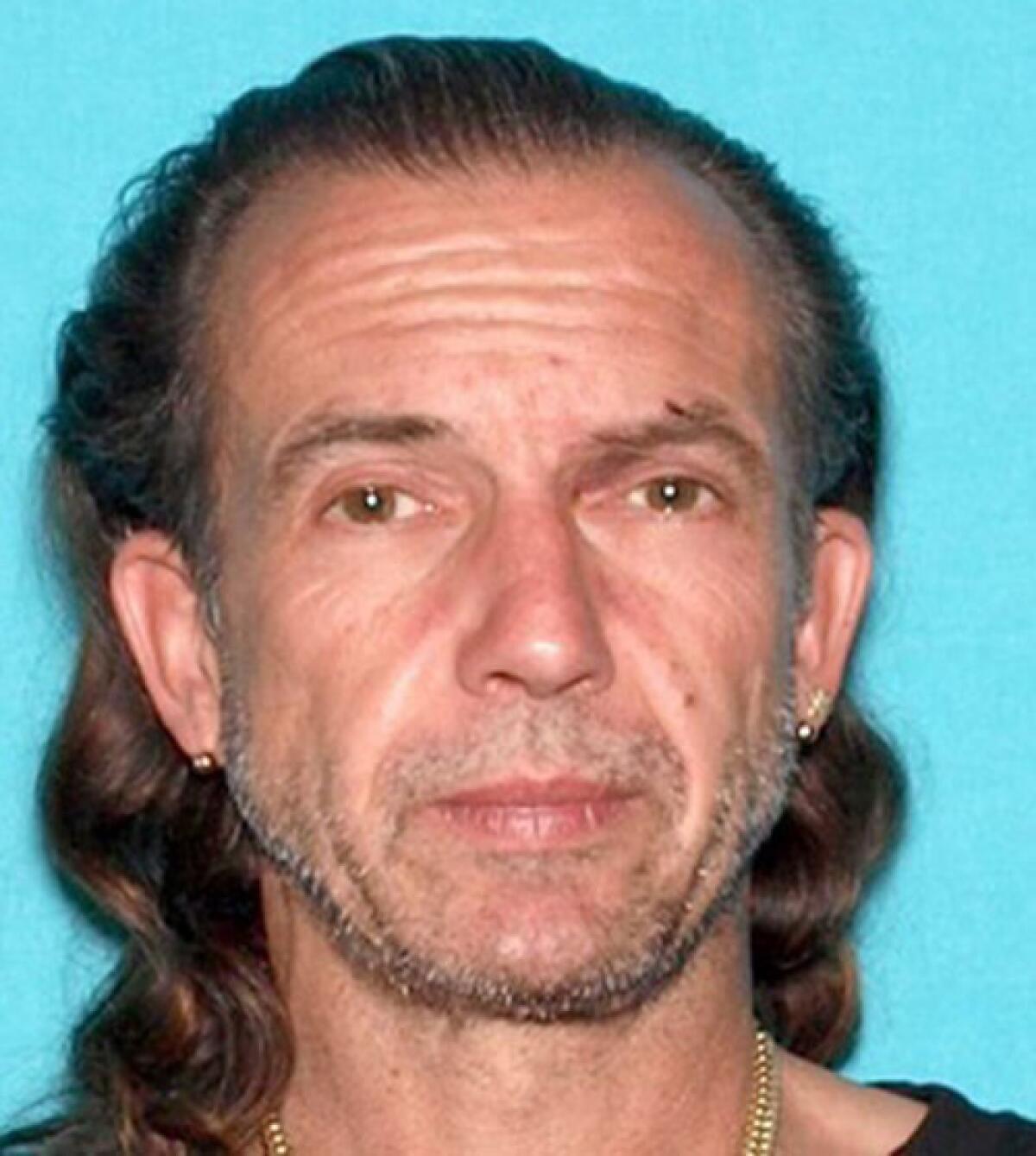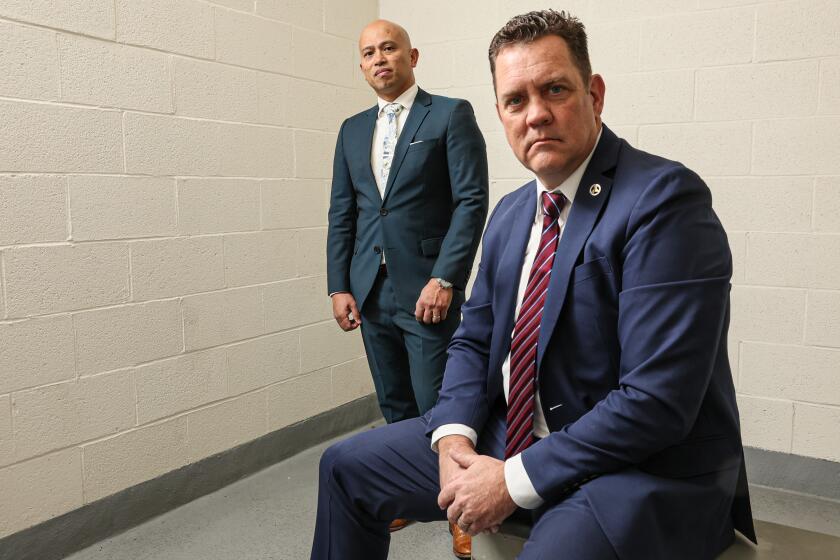Feds arrest suspect they say sold Encino home out from under man who later killed himself

- Share via
Authorities arrested a drug dealer known as “Persian Sean” on Monday for his alleged role in selling an Encino house out from under a man who later killed himself.
Bahram Hassanshahi and his co-conspirators allegedly stole the identities of property owners, forged power of attorney forms in their names and then sold their properties, according to a criminal complaint filed in federal court last week.
Hassanshahi allegedly received $180,000 in proceeds from the theft of Robert Tascon’s home — funds he later told investigators he used to buy drugs for resale. Tascon killed himself in 2022, which his common-law wife told investigators was due to his ongoing battle with depression and his inability to regain his Encino property.
Authorities are accusing Hassanshahi of conspiracy to commit wire fraud, aggravated identity theft and conspiracy to distribute fentanyl and methamphetamine.
Hassanshashi allegedly conspired with Caroline Herrling in the 2021 sale of Tascon’s home for about $1.5 million. Herrling, a former West Hills resident, fraudulently obtained ownership of real estate and money in a near-$3.9 million scheme that also involved dismembering and dumping a dead body, according to the U.S. attorney’s office in L.A.
Investigators describe Hassanshashi as “a self-admitted fentanyl and methamphetamine dealer.” The 63-year-old Woodland Hills resident is the latest person to be linked to a criminal web with Herrling at the center.
Charles Wilding went missing from his Sherman Oaks neighborhood in fall 2020. Investigators trying to find him uncovered an elaborate fraud.
Herrling pleaded guilty last year to conspiracy to commit wire fraud, a crime that encompassed the fraudulent sale of Tascon’s home. She was sentenced to 20 years in federal prison. Another co-conspirator, Jason Kroth, also pleaded guilty to conspiracy to commit wire fraud and is awaiting sentencing.

In an affidavit submitted with the criminal complaint, Lyndon Versoza, a postal inspector, said Tascon had moved to Texas sometime around 2018, while he was in a legal battle to evict squatters who illegally resided in his Encino property.
After Tascon won the eviction case, Herrling and co-conspirators created a fake ID in Tascon’s name, forged power of attorney documents and sold his property without his knowledge or permission, according to Versoza.
Tascon’s Encino home was his last asset, although he still had monthly payments from trusts his family had set up for him in California, according to a U.S. Postal Inspection Service report.
After the house was sold out from under him, Tascon filed a lawsuit in an attempt to get it back.
Tascon killed himself in his Texas home on Sept. 11, 2022. He was 53. The police report noted that he had a history of mental illness and was involved in fraud litigation.
Caroline Herrling pleaded guilty last year to conspiracy to commit wire fraud. Among her victims was Robert Tascon.
In reviewing banking records and escrow documents, Versoza said he observed a forged power of attorney document bearing Tascon’s name, which also had a fake notary stamp. The forged power of attorney document granted a “Shawn Hassanshahi” special power of attorney to sell Tascon’s property, according to Versoza.
The document was submitted to the escrow company to facilitate the fraudulent disbursement of funds stemming from the sale. Hassanshahi signed multiple escrow documents on Tascon’s behalf as the “seller,” Versoza wrote.
In an interview with Versoza, Hassanshahi said he met Tascon in prison and that he later loaned him more than $40,000. Hassanshahi claimed that when he called Tascon to collect the money, Tascon said he could get it through the sale of the Encino home.
Hassanshahi “said he only spoke with Robert Tascon about it that one time but he felt he got permission from Robert Tascon to sell the property,” Versoza wrote.
Around the same time, Hassanshahi told Versoza, Kroth was already trying to sell the Encino house. Kroth introduced Hassanshahi to Herrling as an attorney who could facilitate the sale, according to Versoza.
Hassanshahi said he didn’t know why they had to use fake notaries or fake identity cards to sell the house, Versoza wrote.
By the time of the sale, Herrling already had another scheme going. According to court documents, Herrling used online mapping programs and visited nicer neighborhoods to search for algae-filled swimming pools or overgrown shrubs to identify houses with vulnerable victims who were unable to care for their properties.
After finding such a home in Sherman Oaks in 2020, Herrling and her co-conspirators broke into the residence, where Charles Wilding lived. At some point in September 2020, Wilding died of unknown causes.
Investigators say Herrling and others took over Wilding’s property while his body decomposed inside. She used a forged power-of-attorney form so she could pretend to act on Wilding’s behalf while stealing his real estate and financial accounts, officials said.
After Herrling learned of a police investigation into Wilding’s disappearance, she and her co-conspirators tried to dissolve his body in acid and lye on the rooftop balcony of her apartment, according to the prosecutor. When that didn’t work, she and others dismembered the body, placed the pieces in vacuum-sealed bags and dumped the body into the San Francisco Bay.
Wilding’s remains have never been found.
Earlier this year, another Herrling co-conspirator, James Kantor, agreed to plead guilty tied to the scheme. He admitted to forging a trust agreement and certification of trust for decedent June Wilding so that her property could be controlled by Herrling.
Kantor also admitted to creating a fraudulent petition to speed the transfer of the Wilding property into the fraudulent trust controlled by Herrling.
According to the plea agreement, Kantor received at least $64,000 stolen from the estates of June and Charles Wilding.
More to Read
Sign up for Essential California
The most important California stories and recommendations in your inbox every morning.
You may occasionally receive promotional content from the Los Angeles Times.












